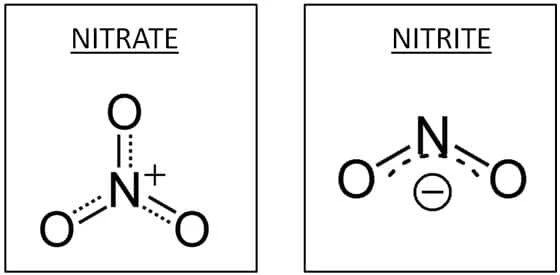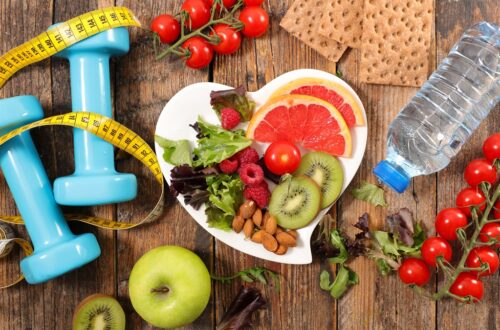Understanding Nitrates and Nitrites
Nitrates (NO₃) and nitrites (NO₂) are chemical compounds composed of nitrogen and oxygen atoms. They are naturally present in soil, water, and various plant-based foods, where they play essential roles in nitrogen metabolism and plant growth. Nitrates can be converted into nitrites by bacteria in the mouth, gastrointestinal tract, and certain foods.
Sources of Nitrates and Nitrites in Foods
Plant-Based Foods
Nitrates are abundant in many vegetables, especially leafy greens like spinach, lettuce, and arugula, as well as root vegetables like beets, carrots, and radishes. These foods absorb nitrates from the soil as they grow.
Water
Nitrate contamination of water sources, primarily from agricultural runoff and fertilizers, can contribute to dietary nitrate intake, particularly in areas with high agricultural activity.
Processed Meats
Nitrites are commonly used as preservatives in processed meats such as bacon, sausage, ham, hot dogs, and deli meats to prevent bacterial growth, enhance flavor, and impart a pink color. Nitrites can also form naturally in cured and fermented meats during processing.
The Role of Nitrates and Nitrites in Health
Nitric Oxide Production
In the body, nitrates can be converted into nitric oxide (NO), a molecule that plays a crucial role in regulating blood flow, blood pressure, and cardiovascular health. Nitric oxide helps dilate blood vessels, improve circulation, and support overall cardiovascular function.
Antimicrobial Properties
Nitrites act as antimicrobial agents, inhibiting the growth of harmful bacteria such as Clostridium botulinum, which can cause foodborne illness. This property makes nitrites valuable as preservatives in processed meats, helping to extend their shelf life and enhance food safety.
Potential Health Concerns and Controversies
Despite their physiological roles and beneficial effects, nitrates and nitrites have been the subject of controversy and concern due to potential health risks associated with their consumption, particularly in processed meats. Here are some key points to consider:
Formation of Nitrosamines
Nitrites can react with compounds called secondary amines, which are naturally present in protein-rich foods, to form nitrosamines. Some nitrosamines, such as N-nitrosodimethylamine (NDMA) and N-nitrosodiethylamine (NDEA), are known carcinogens and have been linked to an increased risk of certain cancers, particularly colorectal cancer.
Processed Meat Consumption
Epidemiological studies have found associations between high consumption of processed meats and an increased risk of chronic diseases such as cardiovascular disease, type 2 diabetes, and certain cancers. While the exact mechanisms are not fully understood, the presence of nitrites and other additives in processed meats may contribute to these associations.
Nitrate/Nitrite Intake and Health Outcomes
Research on the health effects of dietary nitrates and nitrites is complex and multifaceted. While some studies have suggested potential health risks associated with high nitrate/nitrite intake, others have found no significant adverse effects or have even reported potential health benefits, particularly from dietary sources such as vegetables.
FAQs (Frequently Asked Questions)
Are nitrates and nitrites in foods harmful?
The safety of nitrates and nitrites in foods is a complex issue. While high intake of processed meats containing nitrites has been associated with an increased risk of certain health problems, dietary nitrates from vegetables are generally considered safe and may even offer health benefits.
Can consuming processed meats increase cancer risk?
Some studies have found associations between high consumption of processed meats and an increased risk of certain cancers, particularly colorectal cancer. The presence of nitrites and other additives in processed meats may contribute to these associations, but other factors such as high fat and salt content also play a role.
Are there benefits to consuming nitrates from vegetables?
Yes, dietary nitrates from vegetables may offer several health benefits. Nitrates can be converted into nitric oxide in the body, which helps support cardiovascular health by dilating blood vessels, improving circulation, and reducing blood pressure. Additionally, vegetables are rich in essential nutrients and antioxidants that contribute to overall health and well-being.
How can I reduce my intake of nitrites from processed meats?
To reduce your intake of nitrites from processed meats, consider limiting your consumption of bacon, sausage, hot dogs, deli meats, and other cured or smoked meats. Instead, focus on incorporating lean proteins like poultry, fish, beans, and legumes into your diet, along with plenty of fruits, vegetables, whole grains, and nuts.
Are there regulations governing the use of nitrates and nitrites in foods?
Yes, regulatory agencies such as the U.S. Food and Drug Administration (FDA) and the European Food Safety Authority (EFSA) have established maximum allowable levels of nitrites in processed meats and other food products to ensure consumer safety. Additionally, food manufacturers are required to label products containing added nitrites.
Can I still enjoy processed meats in moderation?
While it’s best to limit consumption of processed meats due to their high nitrite content and potential health risks, enjoying them occasionally as part of a balanced diet is unlikely to cause harm. However, for optimal health, focus on incorporating a variety of nutrient-rich foods, including fruits, vegetables, whole grains, lean proteins, and healthy fats, into your diet on a regular basis.
Are there alternatives to processed meats that are lower in nitrites?
Yes, there are alternatives to processed meats that are lower in nitrites. Look for nitrite-free or reduced-nitrite options available in grocery stores, or consider preparing your own homemade versions of favorite processed meats using natural ingredients and minimal additives.
Conclusion
Nitrates and nitrites are naturally occurring compounds found in various foods, as well as added as preservatives to processed meats. While concerns about the potential health risks associated with nitrate and nitrite consumption exist, particularly in processed meats, the overall safety and health effects of these compounds depend on various factors, including dietary sources, intake levels, and individual health status. By focusing on a balanced diet rich in whole, minimally processed foods like fruits, vegetables, lean proteins, and whole grains, you can minimize potential risks associated with nitrate and nitrite intake while promoting overall health and well-being. As with any dietary component, moderation, variety, and informed choices are key to achieving optimal health outcomes.






